- Best Shipping Containers
- Best Return
- Best Cutting-Edge African Art
- Best Nightlife Spirit
- Best Old Stuff
Historically, Bronzeville is known for its high volume of Black residents, many of whom originally came to Chicago during the Great Migration, between 1910 and 1920. I know Bronzeville best for what these residents did once they got here, making the neighborhood a mecca for arts and culture. Colorful tributes made through murals, statues, and structural art can be seen driving along popular boulevards and avenues. The architectural structures found in Bronzeville are just as breathtaking as its tribute to art and culture, with many mansions, three-flats, and greystone homes to admire as you make your way along the streets. Many valued and well known contributors to African American history have called these buildings and this neighborhood home: Gwendolyn Brooks, Ida B. Wells, Nat King Cole, Dr. Margaret Burroughs, Bessie Coleman, Louis Armstrong, Robert Abbott, and Dr. Daniel Hale Williams top a constantly growing list of brilliant people.
As a current resident, I frequently discover something new and amazing about the people who have lived in houses I’ve walked past or have stood in buildings I’ve visited. I was thrilled to learn that the poet I admired as a child would write her poetry at the piano I stood by during an art exhibition at the South Side Community Art Center. Moments like these make Bronzeville more than a place to live, but a place to grow and develop as a writer, poet, and spoken word artist. Being informed of Bronzeville’s storied past—and how it still thrives in the present—has invoked a sense of pride and confidence that encourages me to remain loyal to this community: it is my desire that one day I too can be mentioned as a contributor to the culture. The first Great Migration was only the start of how influential this community would be to the U.S’s history, especially among the arts. The power of Bronzeville’s art, history, and culture to revitalize, recreate, and express is a vital demonstration of the impact of African Americans on the entirety of American culture.
Regardless of Bronzeville’s spot on the list of areas under the threat of gentrification, the community’s connection to its historic roots is strong, and is often celebrated with events and tours throughout the year. And in day-to-day life, this neighborhood has always encouraged the growth of many locally owned and operated cafes, restaurants, boutiques, gardens, shops, and galleries. To spotlight just a few this year was not easy, but these are among the best and brightest in their efforts to keep Bronzeville culture alive.
Oduda Maali is a writer who has lived in Bronzeville for eleven years. She is best known for her work as a mentor, instructor, and advocate for youth development.
Boxville
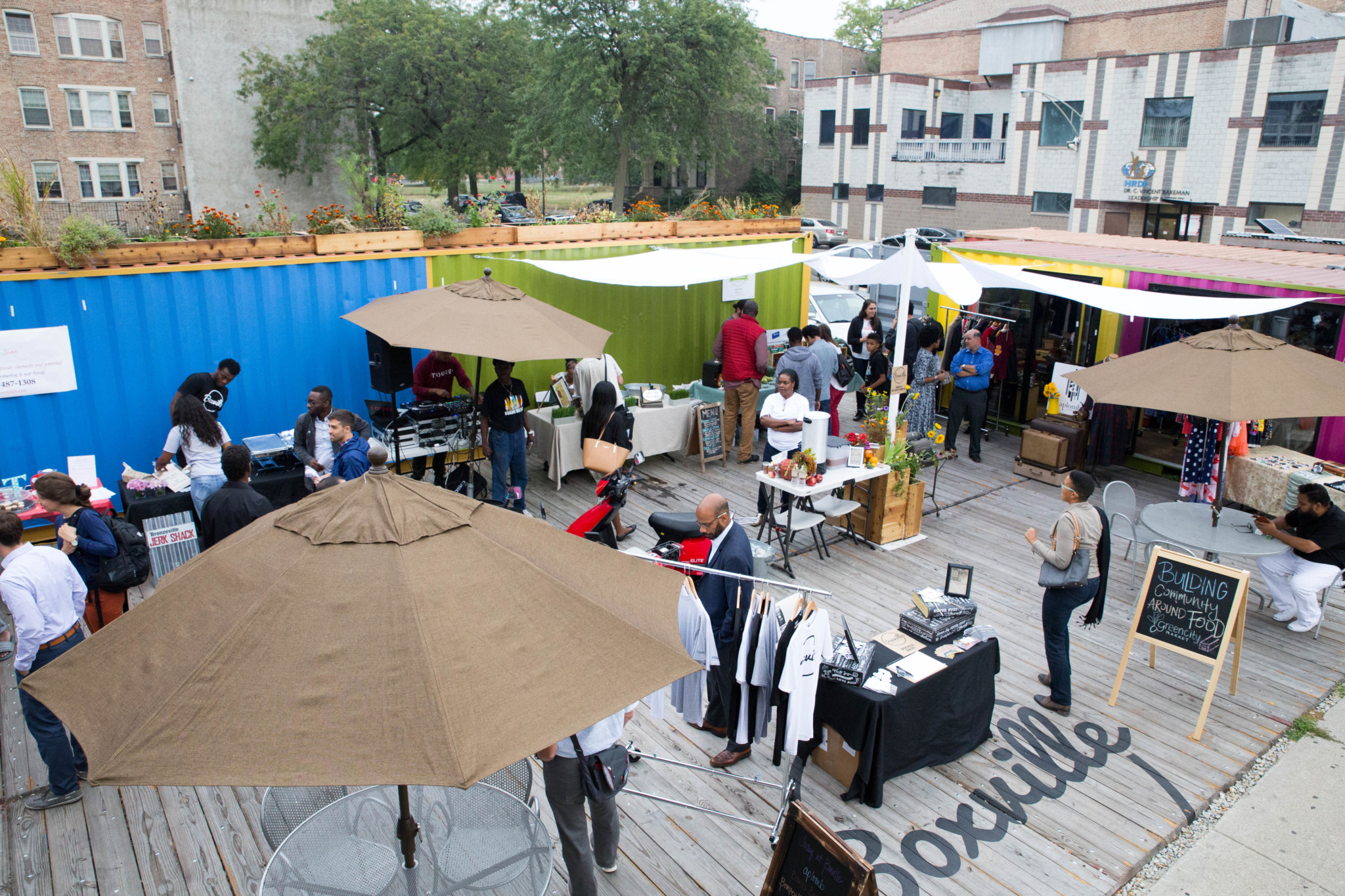
Standing in a shipping container right off the steps of the 51st Street Green Line “L” stop one recent Wednesday, Michelle E.L. Merritt explained her philosophy for working with vendors and entrepreneurs who ply their wares at Boxville, the once-weekly market that she manages. “Provided that they’re serious about their business, we provide the platform for them to come out and sell,” she said over the sounds of a DJ alternating between classic hip-hop and recent Top 40. “So it’s not judged, it’s not a curated market. Our goal is to provide goods and services that are not currently in the neighborhood, but there’s a demand for.”
Boxville, which has been run out of four shipping containers for a few hours every Wednesday afternoon this summer, is the latest initiative of Urban Juncture, the nonprofit developer behind the culinary/neighborhood revitalization initiative Bronzeville Cookin’ and co-working and concept development space the Bronzeville Incubator. Vendors vary, but the “anchors,” to use Merritt’s term, are streetwear, vintage, fresh produce, and bike repair—and this week, jerk pork and chicken tacos from the Bronzeville Jerk Shack, the inaugural concept restaurant of Bronzeville Cookin’ whose storefront is down the street from Boxville.
Boxville developed an audience of between one and three hundred people per week fairly quickly, according to Urban Juncture president and founder Bernard Loyd, but the process to get to this point has taken years. In 2010, Loyd’s first food-centric neighborhood revitalization program, the Bronzeville Community Garden—across 51st Street from the lot Boxville is on—began attracting neighborhood volunteers, some of whom biked there. Loyd saw an opportunity to grow biking awareness in the neighborhood and began leading thematic tours of Bronzeville. He also hired a bike mechanic friend to fix bikes of neighborhood residents for free one Sunday per month.
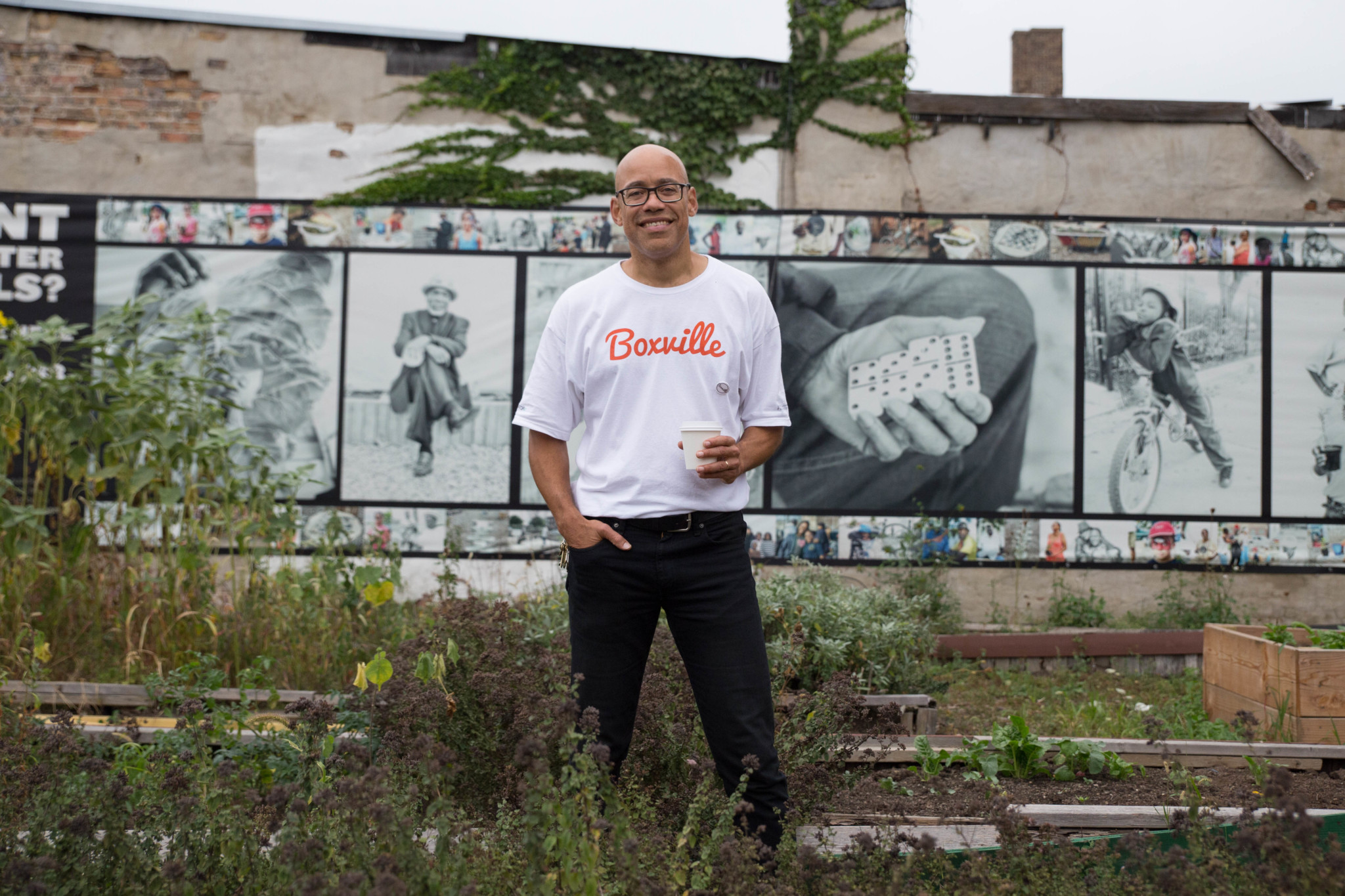
That bike repair service grew into the Bronzeville Bike Box, which opened in a shipping container in 2014 and whose presence provided the real impetus for Boxville. “We were able to develop it very very quickly—six months, versus years, a decade,” Loyd said, wearing a crisp white Boxville T-shirt. “It actually engages people. They see it, and they get engaged, so for a very small investment, we are actually creating a place that is helping to transform this corner. And so we said, hey, we oughta do more of this. And so that doing more of it became Boxville.”
On this particular Wednesday, the space featured Green City Market produce; Poshsway, a streetwear brand run by a man who goes by William Holla!; and the jerk taco stand. Sharing one of the shipping containers were aplomb, a vintage store celebrating African American culture that Merritt runs, and Yail’s Garden, a handmade bodycare line run by Chiquita Lewis, a South Side native who began making her own soaps and toothpaste to combat her autoimmune disorders.
“I love it here, I love the community, I love that it’s great people in an up-and-coming neighborhood,” Lewis said. “Bronzeville was run down a little bit, but now it’s coming up, there’s a lot of Black-owned businesses. …The last time I did the show here, I had my four babies, they were no problem, they were well-behaved. They even had a children’s part over here so the kids could play. It’s really—it’s like tribal community-oriented. I can’t wait to do more. I can’t wait for it to be, you know, have more days.”
According to Loyd and Merritt, Boxville will have lots more days next year. After closing for the season this month, they’re now getting to work expanding the concept to take over the entire lot—and increase the number of boxes by some 900 percent. Loyd said he envisions that the expansion would be open three to five days a week with thousands of customers per day. Merritt referenced the legacy of Bronzeville as a mecca for Black culture and businesses when discussing expansion plans, saying that her focus is on “activating this thoroughfare back to what it used to be.”
It’s an ambitious, impressive plan, somewhat tempered by the realities of long-gestating, somewhat-delayed projects that Urban Juncture is working on—including adding more restaurants to the brick-and-mortar the Jerk Shack is housed in and reopening the classic 43rd Street jazz hall and political gathering space The Forum as a theater and community space, both of which have struggled to attract steady funding, like many projects in Bronzeville in recent years. As Loyd put it, “Everybody wants to revitalize these neighborhoods, but getting from there to the capital, to the resources to do it is another story.” Whatever Boxville ends up looking like next year, though, it will surely be worth visiting. (Sam Stecklow)
Boxville, 320 E. 51st St. Wednesday, 4pm–7pm. The final regular Boxville of the season will be Wednesday, September 27, with additional specialty Saturday markets on September 23 and 30. Check for project updates at facebook.com/Boxville51 and boxville.org. (773) 285-5002. urbanjuncture.com
Rosenwald Courts
“To cure the things that seem to be wrong”—that’s what Chicago philanthropist Julius Rosenwald said drove his philanthropy. This may well be what the Rosenwald Courts apartments have done since opening last fall as a long-promised revival of the historic Michigan Boulevard Garden Apartments site, which shut down in 2000. The new name of the renovated apartment complex cuts to the chase: it was quickly nicknamed “The Rosenwald” after its benefactor when it was completed in 1930, taking up the whole block between 46th and 47th Streets and Michigan and Wabash Avenues. Though it still takes up the whole block, and its website encourages you to imagine yourself “stepping back into the 1930’s” during its heyday, when icons like Nat King Cole and Quincy Jones lived there, this Rosenwald has features welcome in the present day: 239 apartments rather than the original 421, 150 parking spots, and central air, to name a few.
After plans for redevelopment began in 2011, a community group formed in opposition; one of its issues was poorly planned commercial space and the continuing absence of grocery stores in the area. While the Rosenwald’s office and retail space has not yet opened up—the property is still waiting on permits, and community manager Letitia Powell hopes for the space to be open by the end of the year—what’s planned is promising. The tenants, many of them Black-owned businesses, include popular South Side coffee chain Sip & Savor, recent Black Chicago Eats Foodie Award winner Shawn Michelle’s Homemade Ice Cream, and, yes, a grocery store: Metropolitan Premier Grocery, run by the building’s management.
The rest of the tenants, though, came quickly and eagerly—the Rosenwald was completely occupied by December, and has a substantial waitlist for hopeful occupants. They’re not the only ones calling up Powell about the building, either. “I’ve had several individuals call to say how they remember what the building used to be, how they had parents or grandparents or aunts and uncles who were hairdressers, who did different things in the building,” Powell said. “They’re excited to see what new space we’re going to bring to the community.” (Julia Aizuss)
Rosenwald Courts, 4642 S. Michigan Ave. (773) 819-2267. rosenwaldchicago.com
Gallery Guichard
Gallery Guichard features works by artists of African descent from around the world. Founded in 2005 by local artists Frances and Andre Guichard, the gallery seeks to revitalize the surrounding community through art, by bringing the local art scene and the international one together in one gallery. The first floor hosts the gallery’s rotating exhibitions in three large rooms. Above are artists’ lofts, where a number of the gallery’s featured artists stay. And right next door is Migration Park, a sculpture garden and gathering space which houses a solar pyramid by Chicago artist Shala, a collaboration with ComEd.
Inside, the pieces on display tend towards the unconventional and avant-garde. Particularly striking right now are the works of one featured artist, Abiola. In his display, he renders figures out of trashed soda cans and broken plastic flatware, coaxing the scraps and shards into delicate, vivid human forms. Another of his pieces stands outside, in the sculpture garden: a young woman with a parasol, clothed in sliced-up soda cans strung together with wire. In the artist’s hands, the strips of metal have become so delicate as to be almost lace-like, and the configuration sways gently like cloth in the breeze. The use of unconventional materials is a theme throughout the gallery—for instance, two pieces by Bondale Ige are on display which at first appear to be rough swirls of impasto, but on closer examination reveal themselves instead as piles of gleaming glass beads glued to the canvas. Equally fascinating are D-Rock Burnett’s dream-like collages—glossy magazine ads, dismembered and reassembled. (Amelia Soth)
Gallery Guichard, 436 E 47th St. Wednesday, 2:30pm–5:30pm; Friday, 1pm–5pm; Saturday, noon–3pm. Additional hours by appointment. (708) 772-9315. galleryguichard.com
Renaissance Bronzeville
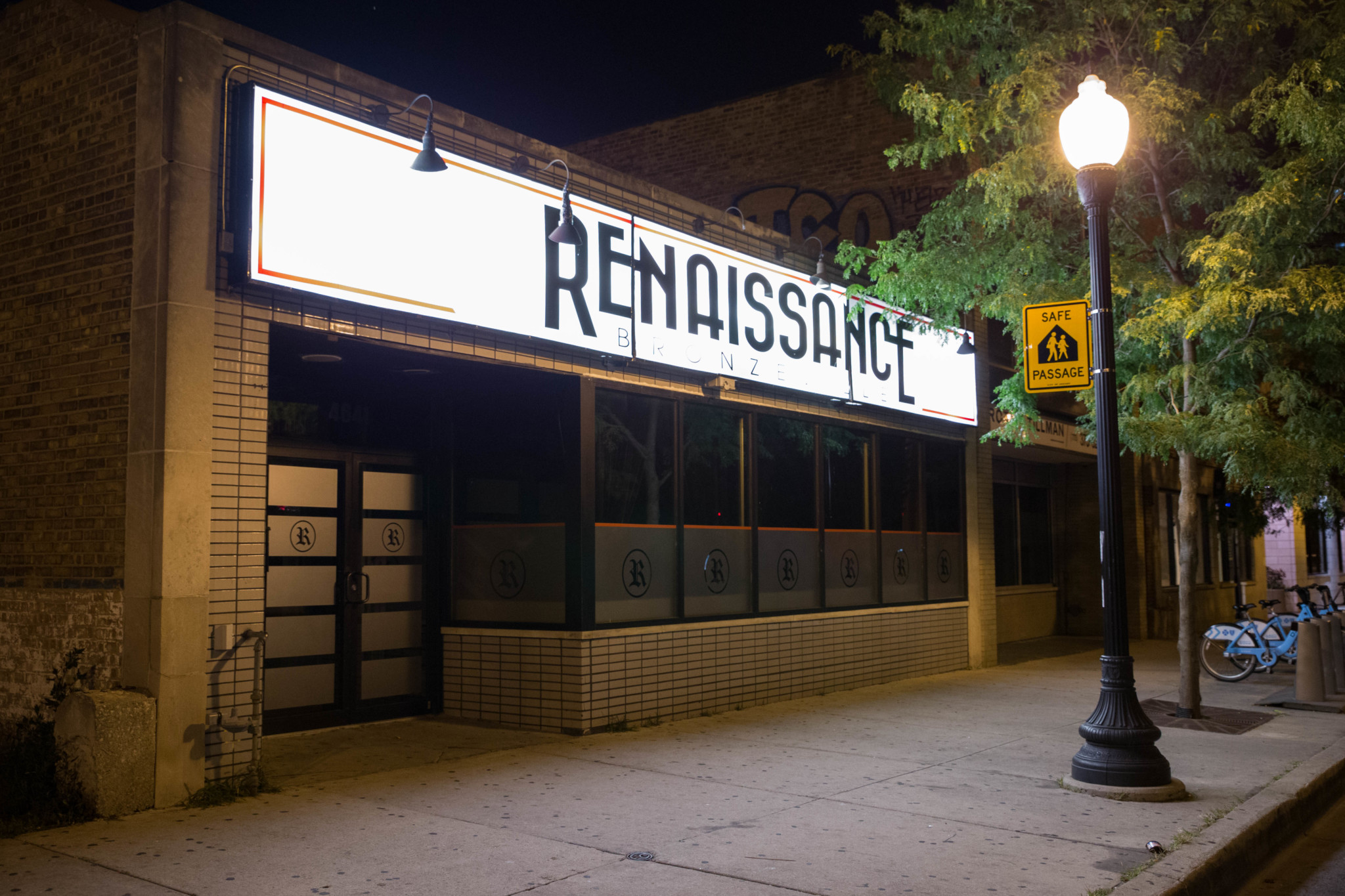
I’m still looking for a South Side spot to hear high-octane blues, smooth jazz, and classic crooning R&B since Lee’s Unleaded Blues in Greater Grand Crossing closed. Nothing yet, but if you’re in the mood for turning up with your twenty-something and thirty-something crew while a weekly rotation of guest DJs spin a spirited mix of hip-hop, house, and trap, then slide on over to Renaissance Bronzeville. This swanky nightspot has repurposed the former Jokes & Notes comedy club location and is making a name as Bronzeville’s only dance-club/sports bar since the days of Chic Rick’s. Reminiscent of the old Cotton Club with a quiet laid-back anteroom, a long bar and sleek vegan leather seating are staged upfront from the doorway to all things lit. Once beyond the anteroom, large flat screens play on mute while the DJ ensconced in the corner spins nonstop beats you can feel. Friendly bar staff dressed in all black keep the cocktails flowing, and there is a cozy cordoned-off section tucked in the back corner that suggests VIP seating. Each night offers a different theme; private parties and events are welcome and most nights there is no cover charge. Ask Antoinette to pour you her fruity Ciroc cocktail. The flavor is live and direct from a Jamaican Dancehall. And speaking of, Uncle Joe’s Jerk is just around the corner. (Nicole Bond)
Renaissance Bronzeville, 4641 S. King Drive. Monday–Friday, 6pm–2am; Saturday, 8pm–3am; Sunday, 3pm–2am. (773) 690-5416. renaissancebronzeville.com
A Lotta Good Stuff Upscale Resale
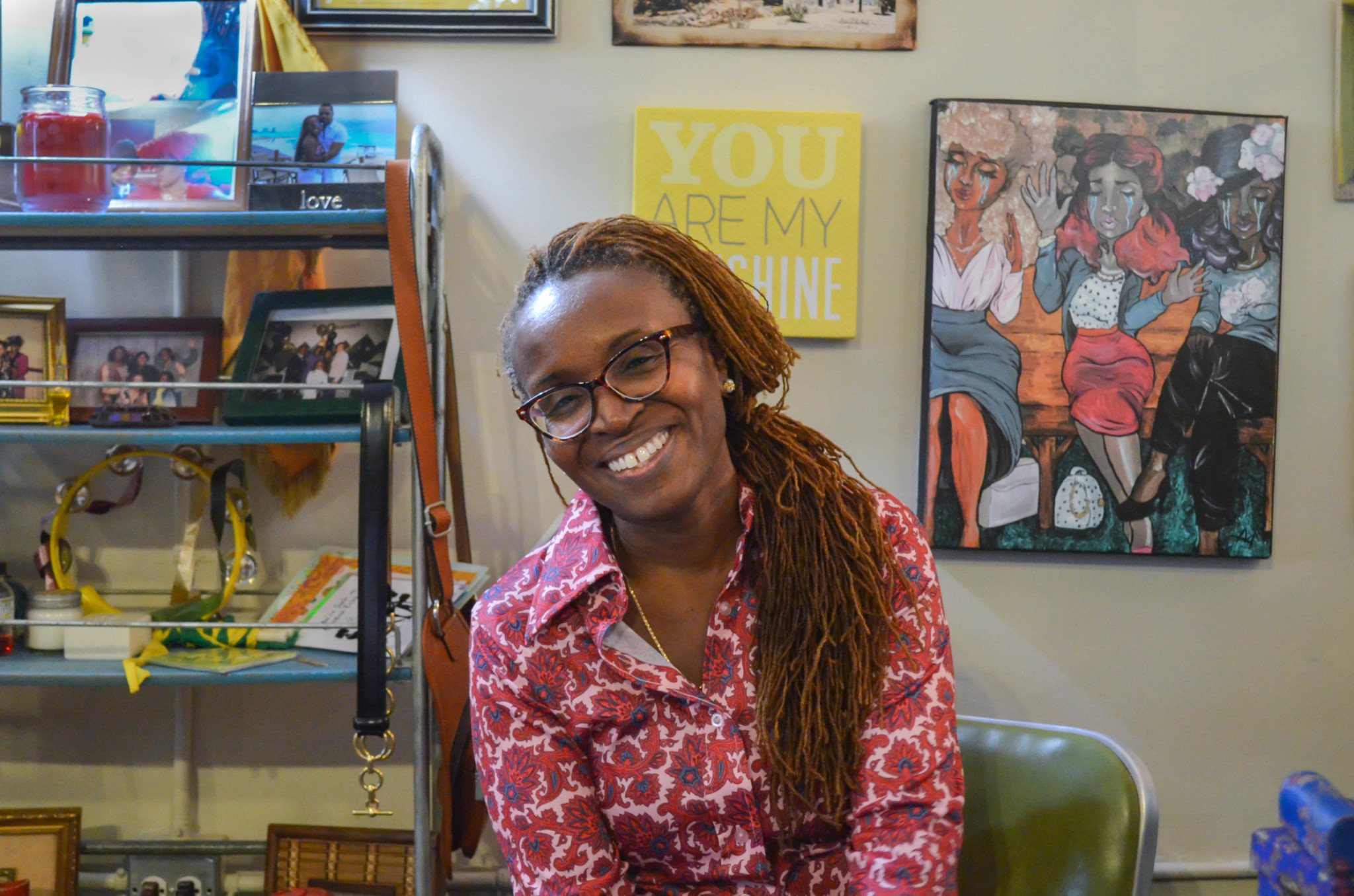
When people walk into Benita Phipps’s A Lotta Good Stuff Upscale Resale on 47th and Vincennes, they remark that it looks like something plucked from the North Side. “I take it as a compliment and an insult at the same time, simply because it implies that we don’t have quality nice venues on the South Side of Chicago,” Phipps said.
To the contrary, Phipps sees being located in Bronzeville, with its rich Black cultural history, as an asset. “We have all these old historic greystones, and redstones, and row houses, and all these mansions in this area that people have inherited from their grandparents, their parents parents and things like that,” she said. “They get all these wonderful pieces inside and all they want to do is get rid of [them]. All this old stuff. That’s all they see is old stuff.”
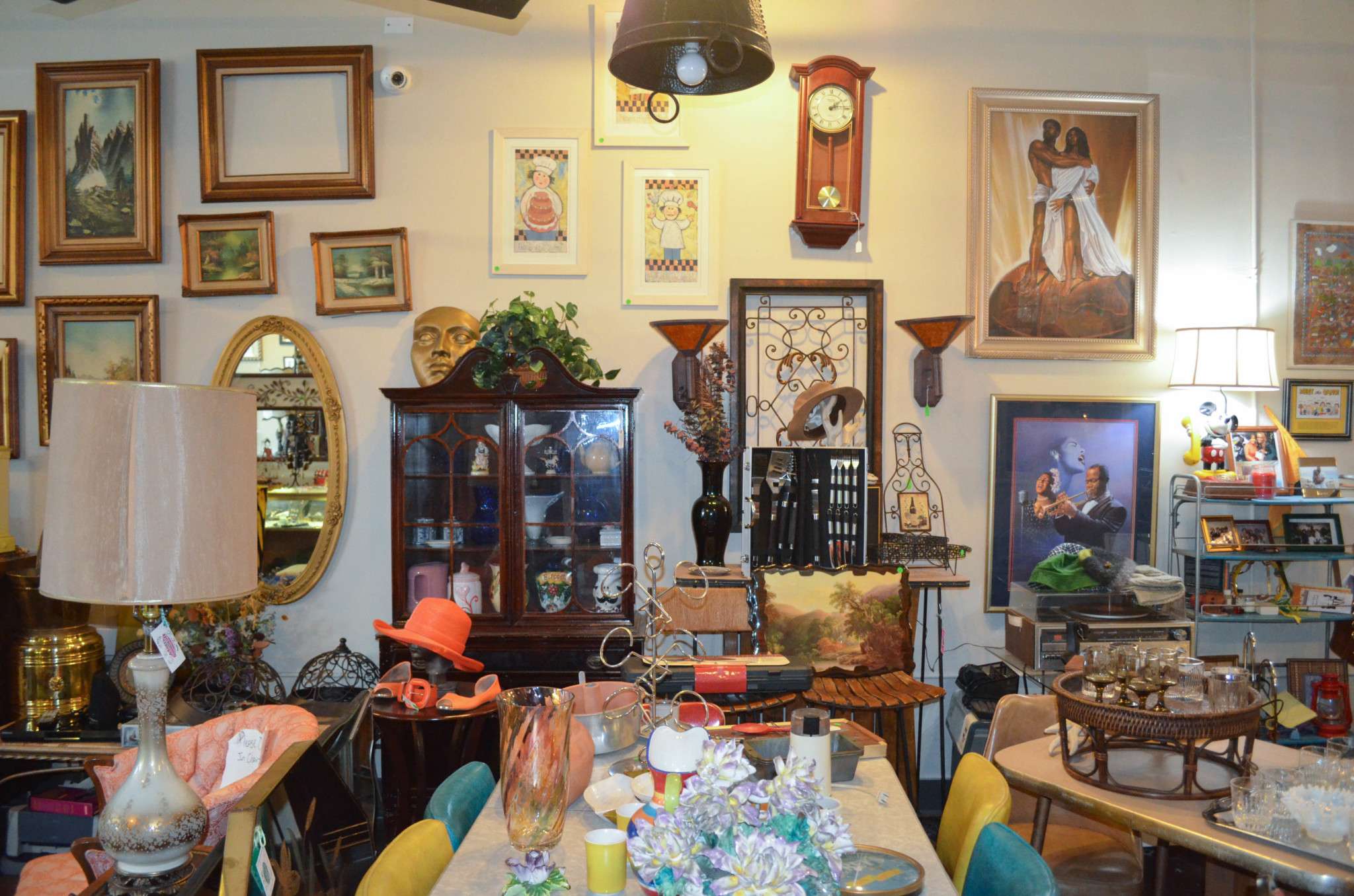
What others see as old-fashioned, Phipps sees as precious. As a natural hair beauty salon owner and interior designer, Phipps has a keen sense of style. She recognizes the significance and potential of the pieces people bring into her store. Items range from paintings to furniture to clothing. A typewriter sits atop a chest of drawers. A vintage display case holds assorted jewelry. But A Lotta Good Stuff is more than just a resale and consignment shop. Phipps recognizes the potential in people as well, and uses her store to recycle goodwill within her community. “I have homeless people that come in,” she said. “They may come in and ask for a dollar or whatever, but I see that you don’t have a hat on your head, you don’t have gloves, the shoes you have don’t fit or things like that. Let me give you some socks, here’s a scarf, you know? And they remember that… If you spend five minutes talking to some of these people, they’re so nice inside, and, they’re such [great people]. But we can’t get past what we see on the outside.”
Phipps hopes A Lotta Good Stuff changes the conversation around appearances. She purposely invested time, money, and energy into designing the exterior of her shop to make it welcoming and inviting, to draw people in so they enter and recognize the quality that can be found in Bronzeville. “That’s why I’m not on the North Side and why I’m here.” (Erisa Apantaku)
A Lotta Good Stuff Upscale Resale, 501 E. 47th St. Tuesday–Thursday, 11am–6pm; Friday–Saturday, 10am–7pm. (708) 724-3997. facebook.com/alottagoodstuffupscale
Support community journalism by donating to South Side Weekly

